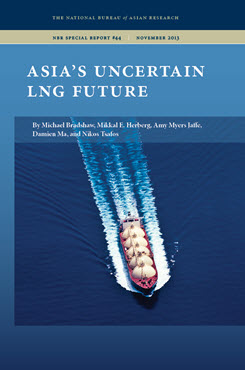The New Geography of Asian LNG
This essay examines Asia’s growing demand for liquefied natural gas (LNG) and explores the geoeconomic and geopolitical implications of Asia’s quest to secure sufficient LNG supplies to meet its energy needs.
EXECUTIVE SUMMARY
This essay examines Asia’s growing demand for liquefied natural gas (LNG) and explores the geoeconomic and geopolitical implications of Asia’s quest to secure sufficient LNG supplies to meet its energy needs.
MAIN ARGUMENT
Asia’s LNG market is being transformed by the growth in the number of buyers and sellers as well as by a wider reach that will link Asian buyers to suppliers in Australia, North America, and East Africa. The diversification of supply sources will boost Asia’s energy security but will also create new linkages requiring careful political management. Much of Asia’s new supply will come from Australia, the U.S., and Canada. In the recipient countries, foreign investment from Asian companies could create a backlash at the local and national levels; in the importing countries, dependence on the West could easily trigger insecurity and calls for openness and a level playing field. Thus, despite the undeniable energy-security benefit that will come from greater diversification, political oversight and management will be essential to sustain this system and contain the geopolitical fallout that such large-scale trade relationships often entail.
POLICY IMPLICATIONS
- The diversification of Asia’s LNG markets will have positive effects on energy security by creating system resilience and reducing the vulnerability of buyers and sellers to individual disruptions in the supply chain.
- Despite new linkages between buyers in Asia and suppliers in Australia, North America, and East Africa, the growth in supply choice will not trigger a massive decline in prices and thus the quest to lower the import burden from energy costs will continue.
- The trade relationships created by LNG will need to be carefully managed to ensure that foreign investment does not trigger a backlash in the host countries and that importing countries—in particular, China—do not feel beholden to the West.


